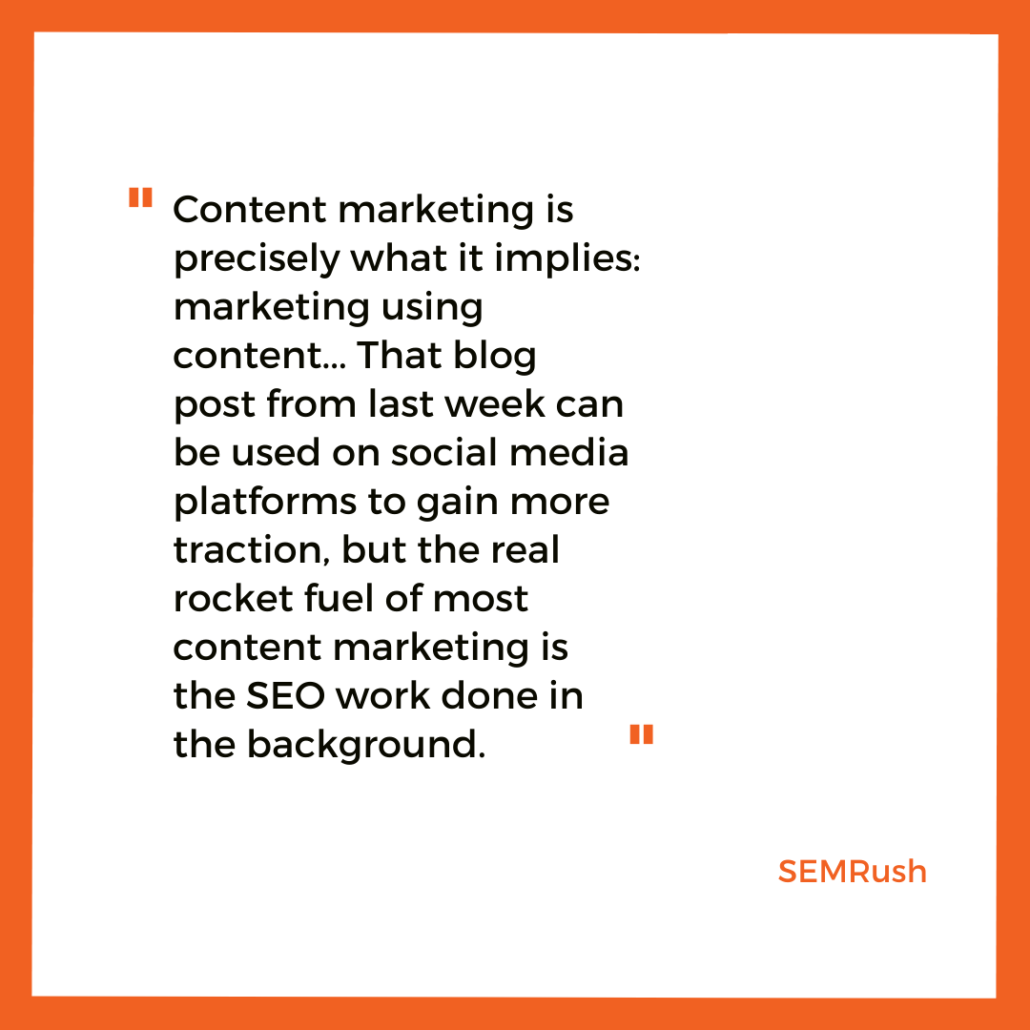© Digital Storyteller 2020
Get The Secret Sauce
Delivered right to your inbox (napkins optional)
© Digital Storyteller 2020
SEO, AIDA, CRM, KPI, GA… In the world of content marketing, the list of marketing abbreviations and digital advertising acronyms can be overwhelming. So, let’s start with one: SEO. Better yet, how do SEO and content marketing work together for the benefit of your business? They are, after all, complements to one another. Here are some fundamental definitions along with our best tips on how to effectively combine SEO and content marketing.
Search Engine Optimization, or SEO, is “the practice of increasing the quantity and quality of traffic to your website through organic search engine results,” according to Moz.
SEO, in turn, is the way marketers tailor their content to appeal to search engines such as Google. In today’s world, search engines rule the scene.
Here’s an example. Let’s say you’ve just finished a workout class and are on the hunt for a well-deserved smoothie. Where do you start? I’m willing to bet it’s Google. You might pull up your search bar type in something like “smoothies near me” or “best smoothies for cheap.”
The way that Google provides results based on your search is determined by SEO. Got it? For more on SEO, check out this article we wrote on why SEO is important and this article for 10 tips to maximize your SEO efforts this year!
SEO is the behind-the-scenes information that tells Google, “Hey, this is what information my website has, this is what I’m talking about, and these are the types of people that would find my website interesting!” SEO is the reason that your results page will likely populate sites like Jamba Juice or Nekter Juice Bar and probably won’t suggest visiting a site like Home Depot to find a post-workout smoothie. Google is smarter than you think!

As best put by the Content Marketing Institute, content marketing is “a strategic marketing approach focused on creating and distributing valuable, relevant, and consistent content to attract and retain a clearly defined audience—and, ultimately, to drive profitable customer action.”
Today, the sales pitch style of traditional marketing is decreasing in popularity every day. Content marketing, instead, approaches prospective clients by providing useful, relevant content to help solve problems or answer questions.
Effective content marketing utilizes the “creating and sharing [of] relevant articles, videos, podcasts, and other media.” This helps to establish expertise, increase brand awareness, and bring your business to the minds of prospects when the time to purchase a product or service comes.
In today’s day and age, there is no excuse to not be using SEO and content marketing to your advantage. But how can you effectively combine the two? Each component complements the other.
As SEMRush puts it, while you can have content marketing efforts in action—crafting blog posts, sharing on socials, and so on—it is all done in vain without the “real rocket fuel of… SEO work done in the background.”
The opposite is also true. If you have a strong SEO strategy, it does not matter if the quality of the content you are pushing out is poor. After all, “SEO is not a potion that fixes bad blogs and websites and makes them magically appear on page one of search results.”
This considered, SEO and content marketing need one another. Like peanut butter needs jelly! Here are our best tips to effectively combine SEO and content marketing today.
This is a phrase we can’t get enough of here at Digital Storyteller! We believe that while keywords are important to keep in mind while writing, writing with a “keyword-first approach” makes content clunky and hard for real human readers to digest.
Additionally, if you make the mistake of writing for bots, you are more likely to fall into the pit of keyword stuffing, which is a big marketing no-no! Always write for humans first, then optimize for search engines.
The basic on-page SEO elements you need to consider include:
But no matter how great your SEO strategy is, no amount of SEO in the world can “fix” a poorly written article. This, in turn, means your content is not getting in front of the eyes you want it to be—which is a complete waste of your time.
When you write for humans, you’re more likely to be crafting quality, useful content. Search engines are getting smarter and smarter every day and one of the “factors that they consider when sifting through content is quality,” according to SEMRush. In fact, search engines can recognize if a piece of content is:
Search engines also look at how often they publish new content. When you push out quality content on a consistent cadence, search engines like Google recognize and reward you for it.
This is why we utilize monthly content calendars for our clients at Digital Storyteller! Content calendars are one of the most important tools within your marketing toolkit. “A content calendar,” according to DivvyHQ, “allows you to organize your efforts in a visual manner while enabling clear communication of your campaign schedules and editorial plans.”
Get your free content calendar template on the house here!
So, you’ve probably heard of link backing! Link building is a great way to effectively combine SEO and content marketing. But what is it, for those who don’t know?
Simply put, link building is the process of getting other websites to link back to your own. Why is this important for your business? Well, link building drives traffic from other sites directly to yours. As you continue to build links, it can aid in increasing your site authority and even in giving you a higher ranking on search engines, like Google!
Sites can link back to you through guest posts and contextual links. Importantly, the more quality content you have on your site, the more likely someone is to link back to it.
It’s important to note, however, that not all links are “good” or helpful. In fact, some links can be damaging to your site authority. For example, if an adult site is linking your business for some reason, this will likely damage your credibility. Additionally, when sites that are irrelevant to your business link back to you, it is not very relevant. So, in short, not all backlinking is helpful to you.
Luckily, SEO can help you discover what links and “good” and “bad” for you! Part of the puzzle is monitoring these links. You will be rewarded as significant, credible sites begin to link to you.
How could we ever!? Social media is a great place where you can combine SEO and content marketing. Here are some pointers:
Do you want to rank on the first page of Google? “The best way to combine the two disciplines effectively,” according to Oncrawl “is to incorporate your SEO keywords into your content to make it look as natural as possible”—and we completely agree! But we recognize that this isn’t always easy.
Being visible online goes a long way to growing and maintaining your business. When you’re easily found and high-ranking, prospects are more likely to trust you, your business, and the products or services you offer. Being easily found on search engines also allows you to foster relationships with current and prospective clients.
But crafting a personalized content marketing strategy for your business takes time and effort, and sometimes, you don’t have that. Enter Digital Storyteller!
Our outsourced digital marketing agency is here to help create content, optimize your site, and make you more relevant to search engines on all social fronts. To develop an organic content marketing strategy with the SEO you need to make your business thrive, reach out to our diverse team of marketing experts at Digital Storyteller today!
© Digital Storyteller 2020
Delivered right to your inbox (napkins optional)
© Digital Storyteller 2020

 What is User-Generated Content and Why You Should Use It
Scroll to top
What is User-Generated Content and Why You Should Use It
Scroll to top
This site uses cookies. By continuing to browse the site, you are agreeing to our use of cookies.
Accept settingsWe may request cookies to be set on your device. We use cookies to let us know when you visit our websites, how you interact with us, to enrich your user experience, and to customize your relationship with our website.
Click on the different category headings to find out more. You can also change some of your preferences. Note that blocking some types of cookies may impact your experience on our websites and the services we are able to offer.
These cookies are strictly necessary to provide you with services available through our website and to use some of its features.
Because these cookies are strictly necessary to deliver the website, refusing them will have impact how our site functions. You always can block or delete cookies by changing your browser settings and force blocking all cookies on this website. But this will always prompt you to accept/refuse cookies when revisiting our site.
We fully respect if you want to refuse cookies but to avoid asking you again and again kindly allow us to store a cookie for that. You are free to opt out any time or opt in for other cookies to get a better experience. If you refuse cookies we will remove all set cookies in our domain.
We provide you with a list of stored cookies on your computer in our domain so you can check what we stored. Due to security reasons we are not able to show or modify cookies from other domains. You can check these in your browser security settings.
These cookies collect information that is used either in aggregate form to help us understand how our website is being used or how effective our marketing campaigns are, or to help us customize our website and application for you in order to enhance your experience.
If you do not want that we track your visit to our site you can disable tracking in your browser here:
We also use different external services like Google Webfonts, Google Maps, and external Video providers. Since these providers may collect personal data like your IP address we allow you to block them here. Please be aware that this might heavily reduce the functionality and appearance of our site. Changes will take effect once you reload the page.
Google Webfont Settings:
Google Map Settings:
Google reCaptcha Settings:
Vimeo and Youtube video embeds:
The following cookies are also needed - You can choose if you want to allow them:
You can read about our cookies and privacy settings in detail on our Privacy Policy Page.
Privacy Policy